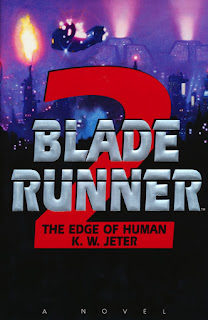Long before the official movie sequel to Blade Runner (1982) was released in theaters as Blade Runner 2049 (2017), another official sequel, this time in the form of a novel, was released in 1995 as Blade Runner 2: The Edge of Human, written by K. W. Jeter.
It's a curious creation, partly because Jeter wrote the book as a sequel not just to the 1982 movie directed by Ridley Scott, but also to Philip K. Dick's 1968 novel Do Androids Dream of Electric Sheep? on which the film was based. This makes for an interesting if slightly challenging read, as their are several differences between the original novel and the 1982 film, in characters, plot, and even intent. But Jeter mostly succeeds in marrying the two universes of the book and film together, by working out the myriad dangling plotlines of both stories, and explaining away several plot holes from the film, one of which - that Deckard was supposed to hunt down six replicants, not five - the whole plot of Jeter's book hinges on.
As a sequel to Blade Runner (1982), the book works fairly well, picking up shortly after the events of the film and adding a number of entertaining twists and surprise appearances by characters that supposedly died in the film. As a sequel to Philip K. Dick's book, it is slightly less effective, as the tone of Dick's original novel clashes considerably with the tone and story of Ridley Scott's film. The book also slows down near to a halt near the middle, with a couple of jarring out of character instances for Deckard, but it picks up again near the end, delivering a grand, fiery finale, with a terrific and haunting final twist that is sure to please fans of the film.
For fans of both Dick's book and Scott's 1982 movie adaptation, this comes highly recommended, as it features a plethora of fascinating details and twists, and pushes the story in a complex and compelling direction. But newcomers and non-fans should stay away.
Text © Ahmed Khalifa. 2020.
Ahmed Khalifa is a filmmaker and novelist. He is the writer/director of the feature film Wingrave, released on Netflix, and the author of a number of novels and short stories, including the YA horror novel, Beware The Stranger, available on Amazon.
Watch the expanded video version of this post:









